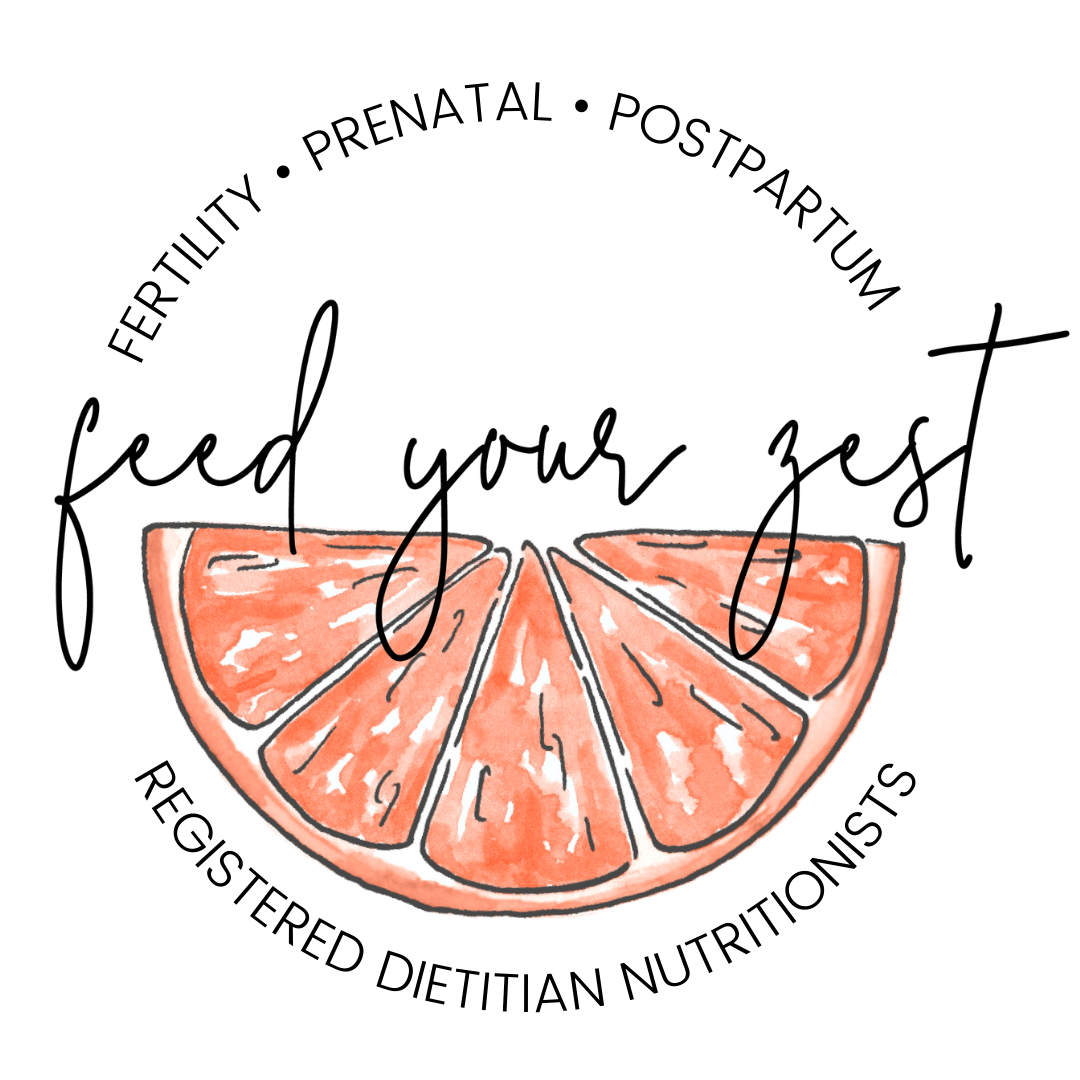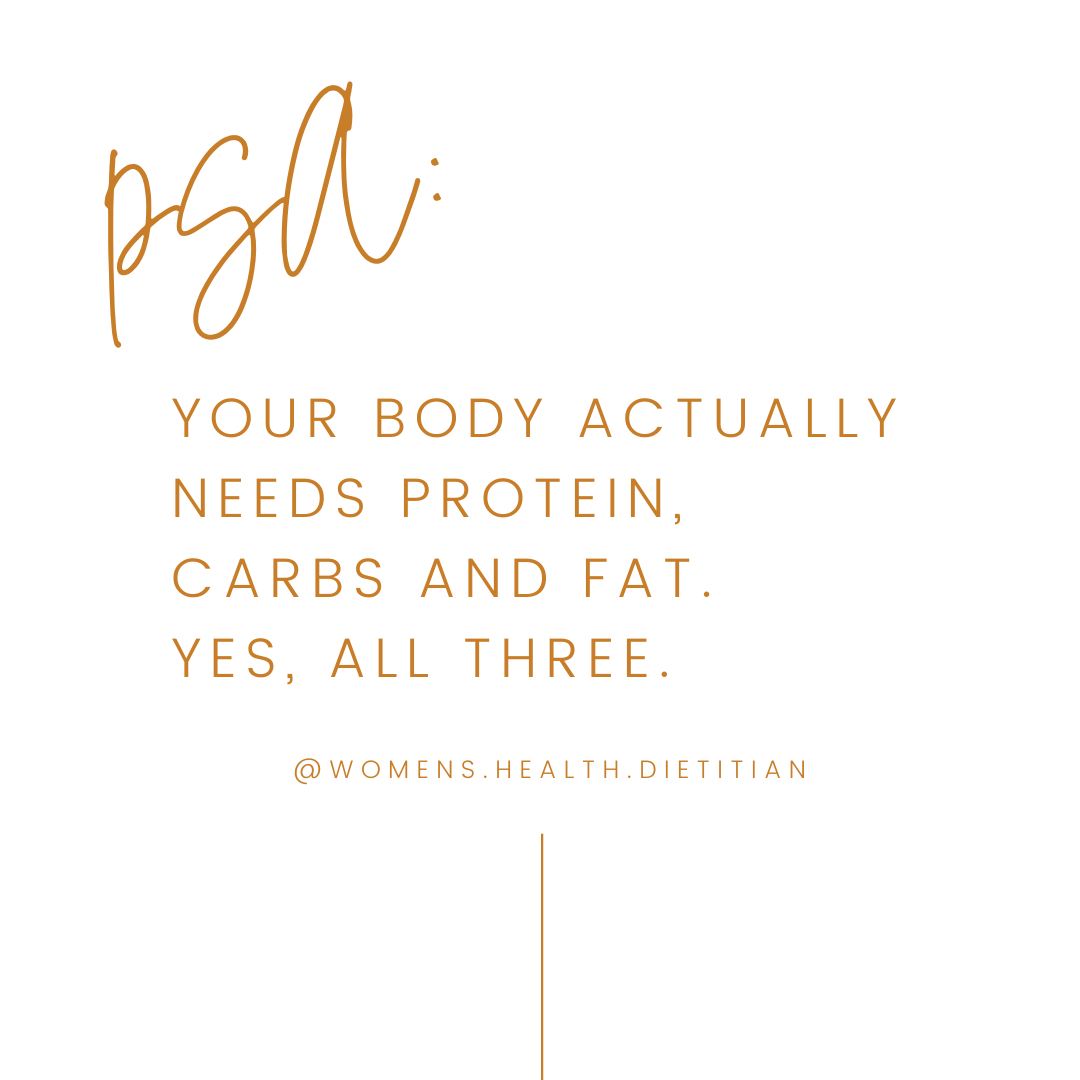Why All 3 Macronutrients Are Important for Women's Health
By Feed Your Zest intern Katie Parker, MS.
If you grew up in the 90’s then you’ll probably remember fat as being the devil. Fast forward to the 2000’s when the devil somehow transformed into carbohydrates and everyone started putting butter in their coffee. To my knowledge, protein hasn’t been demonized yet *knocks on wood*.
These diet trends were created by celebrities and/or diet companies who created a product and wanted to make money without caring about the potential harm it would cause. These trends also aren’t backed by science (or the research was found to have conflicts of interest with funding) which is where this blog post comes in. Today we’re going to debunk these diet trends and explain why your body actually needs all 3 macronutrients, specifically for women’s health.
Fats
Fats often get a bad rep but believe it or not, they are crucial for all bodies because hormones are made from fat! Fats provide energy for our bodies, help protect our organs, lubricate our joints, and help absorb essential vitamins like vitamins A, D, E, and K. Even adding in full fat dairy can help with ovulation as well as help manage blood sugars. We need a variety of fats in our diet because different fats provide different benefits. Often saturated fats and omega 6’s are demonized but they are also necessary for human health. One type of fat that may be worth focusing on for gentle nutrition is omega 3 fatty acids. You can find omega 3’s in cold water fish (salmon, sardines, tuna), nuts and seeds, and dairy. The cool thing about omega 3’s is that they've been shown to decrease inflammation, which in turn may help with ovulation. Even if you don’t want to get pregnant, omega 3’s are still beneficial for you, specifically for your mental health. Studies have shown that supplementing with fish oil significantly improved depression compared to placebo. Not only are fats beneficial for your entire body, they also add a ton of flavor to foods -- it’s a win-win! While I personally wouldn’t recommend adding a stick of butter to your coffee (not sure how that tastes good to some people), I’d definitely recommend adding butter to your morning toast or eating full fat yogurt.
Carbs
Bread, potatoes, fruit, cookies, and juices are all examples of carbs. Almost every dietitian’s elevator pitch for why should I eat carbs?, probably sounds something like -- “carbs are your body’s preferred source of energy”. Which is exactly right! In a slightly more scientific way but still very much abbreviated, our bodies need glucose (sugar/carbs) to go through a process called glycolysis, to produce ATP (energy). The reason we say preferred source of energy is because digesting carbohydrates happens faster and takes less energy to create ATP compared to digesting fats or proteins. So, yes, fats and proteins can still produce ATP but it takes more effort to do.
However, what fats and proteins don’t have is fiber. Fun fact: fiber is a type of carb; when you cut carbs, you also cut fiber. Fiber helps rid the body of excess cholesterol, provides food for healthy gut bacteria to thrive, and can help with stable blood sugar and energy levels throughout the day. Fiber’s effect on blood sugar is particularly important for people with PCOS struggling with insulin resistance. It is important to note that there IS such a thing as too much fiber; constipation, bloating, and difficulty meeting energy needs might be signs you are overdoing fiber. Not all your carbs HAVE to have fiber! Fiber needs may be individualized especially if you are in eating disorder recovery or have hypothalamic amenorrhea. Once you work with your dietitian to ensure you are eating enough carbohydrates overall, you can start adding in fiber rich foods to various meals and snacks throughout the day. Some of my favorite fibrous foods are fruits, vegetables, whole grains, legumes and nuts and seeds. If you need meal inspiration check out our cinnamon vanilla chia oats, stuffed cubanelle peppers, or lentil veggie stew.
Protein
While protein hasn’t necessarily been demonized by society yet, there is a growing trend around vegetarianism and veganism (or simply avoiding meat and dairy) for weight loss purposes. Full disclaimer: if you choose to be vegan/vegetarian for ethical/religious reasons then I support you. It is possible to be adequately nourished following a vegetarian or vegan diet but it’s not easy and may take more time thinking about food.
Okay, now back to the point of avoiding/restricting meat and dairy for weight loss purposes. Proteins are broken down into amino acids and there are 20 amino acids; 9 being essential (your body doesn’t make them but need them to survive). The only way to get these essential amino acids into your body is to eat foods that contain them. Amino acids help with hormone production so when you aren’t eating enough foods with essential amino acids, your body won’t be able to function properly. This is specifically important for women because it can negatively affect reproductive health which is still important even if you never want to be pregnant. Foods that contain all of the essential amino acids (complete proteins) are meats, poultry, eggs, dairy, quinoa, and soy products. If you do follow a vegetarian/vegan diet for ethical reasons, you can still get your essential aminos in by pairing plant based proteins together like rice and beans, or other legumes with a whole grain.
The moral of this blog post is that restricting any macronutrient is NOT healthy. Our bodies need fats, carbs, and protein to function properly and science tells us that restriction often leads to an unhealthy relationship with food, and worsened body image and self-esteem. Here’s your sign to stop fearing bread and only eating non-fat yogurt, you deserve to eat all foods and your body will appreciate you for it.
Are you struggling with restricting or limiting one of these nutrients during your fertility journey? Click here to learn more about 1:1 nutrition counseling!

